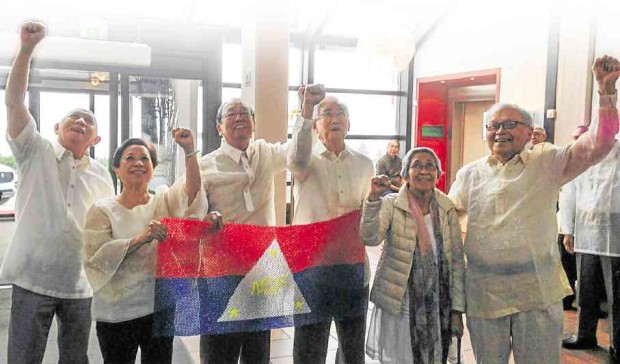Gov’t, Reds OK signing of indefinite ceasefire

WINNING MOMENT Members of the National Democratic Front of the Philippines (from left) Fidel Agcaoili, Coni Ledesma, Jose Maria Sison, Luis Jalandoni, Juliet de Lima and Asterio Palima raise their fists and hold an NDFP flag to mark the end of the first round of peace talks with the government panel in Oslo, Norway. EDRE OLALIA/CONTRIBUTOR
The Philippine government and communist guerrillas have agreed to an indefinite ceasefire extension to facilitate further peace negotiations aimed at ending one of Asia’s deadliest and longest-running insurgencies, a joint statement said last night.
At the end of five-day peace talks in Oslo, Norway, the Communist Party of the Philippines (CPP) agreed to extend a unilateral ceasefire indefinitely. The truce, a goodwill gesture to President Duterte’s own unilateral ceasefire, was supposed to end today.
READ: PH gov’t, NDF sign joint statement; end of talks eyed in 1 year
“The Communist Party of the Philippines and the National Democratic Front of the Philippines (NDFP) shall declare and issue an indefinite unilateral ceasefire order to the New People’s Army (NPA) and the people’s militia, upon the end of their current ceasefire order on Aug. 27, 2016,” the statement said.
Both sides agreed to reconcile and develop their separate ceasefire orders into a single unified document within 60 days. A third party monitoring and mediation body will also handle complaints and alleged violations.
Article continues after this advertisementThe government peace panel was expected to “immediately recommend” to the President the issuance of an amnesty proclamation, subject to Congress’ concurrence, for the release of prisoners listed by the NDFP.
Article continues after this advertisementBoth panels agreed to meet again on Oct. 8-12, also in Oslo.
Milestone
Presidential Adviser on the Peace Process Jesus Dureza described the talks as “a milestone” aimed at ending a protracted rebellion that has lasted more than 40 years, claiming more than 37,000 lives and stunting the growth potentials of the country.
“Not only has President Duterte walked the extra mile. He has also taken a step back to give the NDFP space under his democratic and inclusive government,” Dureza said.
“We will go home with a promise of a just and lasting peace and our soldiers and the combatants of the NDFP finally coming to terms that the war must end,” he added.
The CPP launched its rebellion in 1968. Its armed unit, the NPA, is believed to have fewer than 4,000 fighters, down from a peak of 26,000 in the 1980s when it drew strength from Filipinos fed up with the dictatorship of Ferdinand Marcos.
Peace talks resumed in Oslo this week, after five years, and President Duterte had freed at least 21 rebel leaders to act as “consultants” to the negotiations to show the government’s sincerity.
The peace process, which has dragged on for decades, broke down in 2001 when the Maoist rebels backed out after the US government—followed by the European Union—placed them on a list of terrorist organizations.
Coalition
The peace effort resumed in 2011 under the sponsorship of Norway, but it had often bogged down as both sides accused each other of insincerity. The rebels had also scored the previous governments for refusing demands by the rebels to release captured comrades.
President Duterte, who took office on June 30, has made resumption of the talks a top priority. The onetime university student of CPP founder Jose Maria Sison, 77, who once described himself as a socialist, had vowed to bring peace to a country whose economic potentials have often been weighed down by insurgencies.
He has even raised the possibility of forming a coalition government with the rebels, and his young administration said on Monday it hoped to reach a peace accord within a year.
The two sides hope to breathe new life into the process by discussing simultaneously the outstanding issues of social and economic reforms, political and constitutional changes, and an end to hostilities.
Previous peace talks have dealt with one issue at a time.
The rebels remain particularly active in the countryside, where they are notorious for extortion to fuel their rebellion. They have also regularly attacked police and military forces, sometimes targeting them in urban areas.
The US state department has designated the CPP/NPA a foreign terrorist organization.
Norway welcomes truce
Norwegian Foreign Minister Borge Brende hailed last night’s document as “unprecedented” and offered his government’s commitment to continue assisting in the talks.
“We further welcome the acceleration of the peace negotiation,” he said. “Norway is committed to assist you in your way to peace.”
Government chief negotiator and Labor Secretary Silvestre Bello III thanked his counterpart and expressed a wish that a final peace deal would soon be sealed.
He said the government was looking toward a final peace agreement with the NDFP to end almost half a century of armed hostilities in the countryside.
Apart from the ceasefire, both sides also agreed to reconstitute a list of rebel leaders protected from arrest under a previously signed agreement on safety and immunity from arrest.
The encrypted list will contain the photos and identities of rebel consultants who are “still underground who will be immune to arrest while the peace process is undergoing.”
The government on the other hand would issue documents of acknowledgment for the rebel consultants still in hiding and for the 54 “publicly known NDFP personalities.”
“I am sure the Filipino people appreciate the work of the two negotiating panels and that they are elated by the results of the formal talks,” Sison said. “These advance their struggle for national and social revolution and for a just and lasting peace.” With reports from AFP/TVJ
RELATED STORIES
PH-NDF panels fast-track peace talks